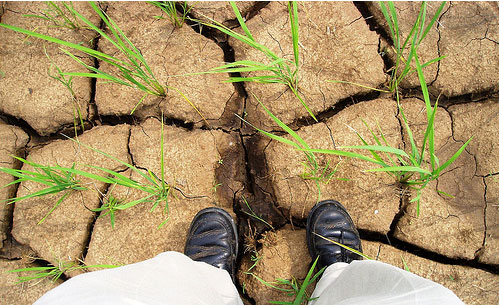
I remember reading some years back that 21st century wars would be fought over water. Life’s essential commodity is becoming more and more scarce, particularly in the regions of the world where desertification is encroaching on the land. The Sahara region through the Middle East to the Red Sea and parts of Europe such as southern and central Spain, have had droughts for years. In Spain, golf courses drink water which should have been used for agriculture. In 2005 I was living in Spain and the problem as I saw it was largely to do with the incredible growth in urbanization – mainly holiday homes for Northern Europeans who do not seem to have an understanding of water conservation. The holiday home and tourism boom has resulted in demands by everyone for a swimming pool and the golf courses that litter the Spanish costas. Velez Blanco, a mountain village which has always had plenty of water, is now facing similar problems as more and more Britons move in. For every new house there is a new pool.
Thousands of miles to the south of Spain another water crisis is emerging in the Nile Basin. Some 300 million people in Egypt, Sudan, Eritrea, Ethiopia, Uganda, the Democratic Republic of Congo, Rwanda, Kenya, Tanzania and Burundi rely on the Nile indirectly and directly along its 6,741-kilometre stretch. In 1999 the countries of the Nile Basin formed the Nile Basin Initiative:
‘The Strategic Action Program represents the Nile riparians’ strategic approach to achieving sustainable socioeconomic development in the basin through “equitable utilization of, and benefit from, the common NileBasin water resources”.’
Egypt and Sudan’s dispute with the other eight countries of the Nile Basin Initiative first came to a head in 2004, when Tanzania wanted to build a 105-mile pipeline pumping water from Lake Victoria, which is fed by the Nile. However, to trace the origins of the dispute, one has to return to the British colonial era and the Nile Water Agreement of 1929 which guarantees Egypt access to 55.5 billion cubic metres of the Nile out of a total of 84 billion cubic metres, with the rest to be divided amongst the remaining Nile Basin countries. It also gives Egypt veto powers over any upstream Nile projects.
‘The Nile treaty, which Britain signed on behalf of its east African colonies, forbids any projects that could threaten the volume of water reaching Egypt. The agreement also gives Cairo the right to inspect the entire length of the Nile.’
The present dispute centres around a challenge by eight of the countries on the validity of the Nile Water Agreement, which they claim is an unjust colonial relic and should not be applicable in a post-independent Africa. One only has to compare Egypt’s population of 80 million and a two-thirds share of the water with that of the other countries’ 200 plus million population and only a one third share to see that the agreement is not sustainable, particularly as countries such as Ethiopia and Eritrea are facing constant droughts.
The new agreement being proposed by members of the Nile Basin Initiative calls for a more equitable redistribution of the Nile waters. However Egypt, with the support of Sudan, is refusing to sign, saying the 1929 Agreement is lawful irrespective of the fact that it was signed during the colonial period. The remaining countries are threatening to go ahead and sign in the next 12 months. Egypt may be right in law when it says that the 1929 Agreement is still valid. But it was an extremely unjust and biased treaty and the needs of the Nile Basin countries have changed dramatically over the past 80 years. The issues at stake here are poverty, the right to water and the right to food – all of these are threatened. Without more access to the Nile waters the lives and agriculture of these countries are not sustainable. The borders between countries are extremely porous and if people cannot access water in one place they will move to where they can in order to survive. It is therefore not in the interest of Egypt or Sudan to place obstacles preventing the other countries from having increased access to the waters. This should be achieved through proper management under a co-operative policy that ensures the longevity of the Nile waters for everyone.
Source: New Internationalist Blog |

